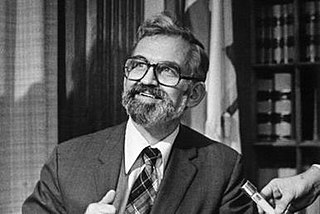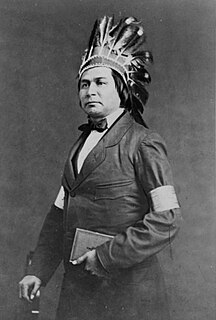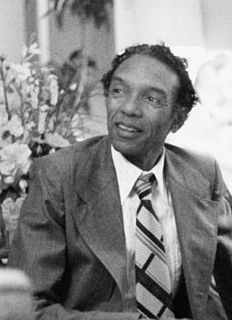
Sir John Alexander Macdonald was the first prime minister of Canada. The dominant figure of Canadian Confederation, he had a political career which spanned almost half a century.

Harold Adams Innis was a Canadian professor of political economy at the University of Toronto and the author of seminal works on media, communication theory, and Canadian economic history. He helped develop the staples thesis, which holds that Canada's culture, political history, and economy have been decisively influenced by the exploitation and export of a series of "staples" such as fur, fishing, lumber, wheat, mined metals, and coal. The staple thesis dominated economic history in Canada from the 1930s to 1960s, and continues to be a fundamental part of the Canadian political economic tradition.
Donald Grant Creighton (1902–1979) was a Canadian historian whose major works include The Commercial Empire of the St-Lawrence, 1760–1850, a detailed study on the growth of the English merchant class in relation to the St Lawrence River in Canada. His biography of John A. Macdonald, published into two parts between 1952 and 1955, was considered by many Canadian historians as re-establishing biographies as a proper form of historical research in Canada. By the 1960s Creighton began to move towards a more general history of Canada.

James Shaver Woodsworth was a pre-WWI pioneer of the Social Gospel, Canadian social democratic and Labour movement.He was a long-time leader and publicist in the movement and was an elected politician under the label, serving as MP from 1921 to his death in 1942. He helped found the CCF, a forerunner of today's NDP, in 1932.
John King Gordon (1900–1989) was a Canadian Christian minister, editor, diplomat, and academic.

Daniel James Macdonnell Heap (1925–2014) was a Canadian activist and politician. Heap served as a Member of Parliament with the New Democratic Party, a Toronto City Councillor, a political activist and an Anglican worker-priest. He represented the Toronto, Ontario, riding of Spadina from 1981 to 1993 and Ward 6 on Toronto City Council from 1972 to 1981. As an activist he was involved in the peace movement, community issues around housing, homelessness, poverty and refugee rights among other social justice issues.

Ernest Lapointe was a Canadian lawyer and politician. A member of Parliament from Quebec City, he was a top adviser to Prime Minister W. L. Mackenzie King, especially on issues relating to legal affairs, Quebec and French-speaking Canada.

Sir James Alexander Lougheed, was a businessman, lawyer and politician from Alberta, Canada. He served as a senator for 35 years, and held a number of Cabinet positions.
Walter George Brown was a Presbyterian Church in Canada minister who opposed the formation of the United Church of Canada and was a United Reform Movement MP in the House of Commons of Canada.

George Copway was a Mississaugas Ojibwa writer, ethnographer, Methodist missionary, lecturer, and advocate of indigenous peoples. His Ojibwa name was Kah-Ge-Ga-Gah-Bowh, meaning "He Who Stands Forever". In 1847 he published a memoir about his life and time as a missionary. This work made him Canada's first literary celebrity in the United States. In 1851 he published The Traditional History and Characteristic Sketches of The Ojibway Nation, the first published history of the Ojibwa in English.

Percival Dearmer (1867–1936), known as Percy Dearmer, was an English priest and liturgist best known as the author of The Parson's Handbook, a liturgical manual for Anglican clergy, and as editor of The English Hymnal. A lifelong socialist, he was an early advocate of the public ministry of women and concerned with social justice. Dearmer, with Ralph Vaughan Williams and Martin Shaw, is credited with the revival and spread of traditional and medieval English musical forms. His ideas on patterns of worship have been linked to the Arts and Crafts Movement, while Dearmer and Vaughan Williams' English Hymnal reflects the influence both of artistic and folkloric scholarship and Christian Socialism. Dearmer ended his life as Canon of Westminster Abbey, from where he ran a canteen for the unemployed.

Arthur Meighen was a Canadian lawyer and politician who served as the ninth prime minister of Canada, in office from July 1920 to December 1921 and again from June to September 1926. He led the Conservative Party from 1920 to 1926 and from 1941 to 1942.
George Williams Brown (1894–1963) was a Canadian historian and editor. Born on April 3, 1894 in Glencoe, Middlesex County, Ontario and died on October 19, 1963 in Ottawa, Ontario.

Lester Bowles Pearson was a Canadian scholar, statesman, soldier, prime minister, and diplomat, who won the Nobel Peace Prize in 1957 for organizing the United Nations Emergency Force to resolve the Suez Canal Crisis. He was the 14th prime minister of Canada from 1963 to 1968, as the head of two back-to-back Liberal minority governments following elections in 1963 and 1965.

Harry Frederick Ward Jr. (1873–1966) was an English-born American Methodist minister and political activist who identified himself with the movement for Christian socialism, best remembered as first national chairman of the American Civil Liberties Union (ACLU) from its creation in 1920 until his resignation in protest of the organization's decision to bar communists in 1940.
John Wallace Baird was a Canadian psychologist. He was the 27th president of the American Psychological Association (1918). He was the first Canadian, and only the second non-American, to hold the office. He was also a founding editor of the Journal of Applied Psychology, and served in subordinate editorial capacities for Psychological Review, American Journal of Psychology, and the Journal of Educational Psychology. At his death in 1919, he was the designate to succeed Granville Stanley Hall as president of Clark University in Worcester, Massachusetts.
William Stewart Wallace was a Canadian historian, librarian, and editor. His historical reference works were considered 'of inestimable value in Canadian studies'.

The Christian Guardian was a Wesleyan Methodist journal founded in Upper Canada in 1829. The first editor was Egerton Ryerson. It ceased publication in 1925 when the Methodist Church of Canada merged with the Presbyterians and Congregationalists to form the United Church of Canada, and merged their journals to create The New Outlook, later renamed the United Church Observer.

Wilson A. Head was an American/Canadian sociologist and community planner known for his work in race relations, human rights and peace in the United States, Canada and other parts of the world.












